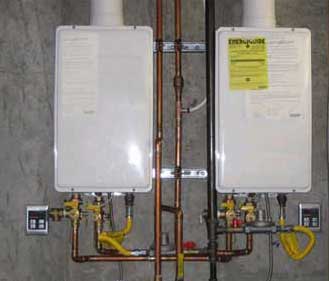What’s not to like about tankless (also known as “on demand”) water heaters? They seem to have everything going for them, unlimited hot water when you need it and you’re not heating water when you don’t need it. They also tend to be highly efficient (92% and above) and take up less space than a conventional water heater. It’s no wonder that tankless water heaters have received high marks from green building advocates.
I was therefore quite surprised to read the article “The Difference Between Storage and Tankless Water Heaters” on BuildingGreen.com with the subtitle “While they have higher efficiency, for most applications tankless water heaters don’t make sense”. This article was even written by the founder of BuildingGreen.com, Alex Wilson, a person whose opinions I follow and respect. While I certainly agree with the article, I just want to point out a couple of local factors that make the article even more relevant for the Tahoe area where we build. Most of the residential construction that we do is for intermittent use, the homes are mostly second, seasonal, vacation homes. This use drives the hot water demand. A classic example is usage during the ski season. A family (maybe with guests) piles into a house (or condo) for the weekend. After skiing all day, everyone wants to take a shower. The water heater, which has been sitting idle for weeks (or months) is now under great demand. This should be a classic solution for a tankless water heater. What’s the problem? A tankless water heater should provide unlimited hot water allowing everyone to take a shower. As always, the devil is in the details.
A tankless water heater will provide endless hot water but at what volume? Tankless water heaters are rated by the gallons per minute (gpm) at a certain temperature rise (delta T). The temperature rise is the difference between the water entering the water heater and the temperature of the water exiting the water heater. The greater the temperature rise, the less flow comes out of the water heater. In other words, the more the water has to be heated, the slower the flow of hot water coming out of the unit. A large tankless unit might produce 8 gpm at a 45 degree temperature rise. Our local problem is the temperature rise. It is not uncommon to see the water coming into the house at 40 to 45 degrees especially in the winter. To get the water up to 120 degrees (a common water heater setting) means the temperature rise is 75 to 80 degrees. This reduces the output (gpm) of the water heater substantially. One person might be able to take a shower if no one else is using any hot water (dishwasher, washing hands, etc.). This is a very simple example and there are other variables at play but you get the idea. Besides being cold, much of our water is very hard with dissolved minerals. Pretty much all the tankless manufacturers recommend cleaning and descaling the unit once a year to prevent mineral deposits from building up and reducing the efficiency. Once a year comes around pretty fast, a plumber will charge around $300-400 to do this.
Is all this effort worth it to eliminate the cost of heat loss from a conventional tank? How much does heat loss cost anyways? Thank god for the internet. A mathematician at Leaning Pine Software has done both the calculations and testing to answer this question. I’m not going to go through the math or calculations here but using his numbers, I come up with heat loss cost of approximately $100 a year (again, many variables at play).
As much as I would love to love tankless water heaters, it is my opinion that we have local conditions that make them not the best option. Added to these local circumstances, they also have high initial installation costs added to the ongoing maintenance costs. Having said that, there some applications where a tankless unit would be the best option (a small condo or apartment for one or two people comes to mind). Also tankless units are evolving and improving. We now have hybrid units, a tankless water heater with a small storage tank. Hmmm…
What is the best water heater strategy? It is my opinion that there are several options but no best universal solution. A couple of these options will include multiple conventional water heaters (both gas and electric). The best solution will be specific to the size of the house and its intended use.


Leave a Comment